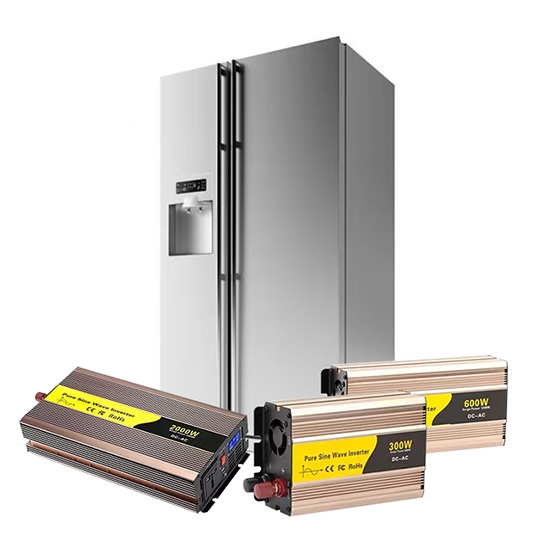A pure sine wave inverter is a key solar power generation system component. It is responsible for converting the low direct current (DC) voltage from the photovoltaic (PV) array into a standard alternating current (AC) voltage. Pure sine wave inverters play a vital role in many fields and applications, especially in situations where a high-quality AC power supply is required. In a home solar system, a pure sine wave inverter can generate pure sine wave AC power that matches the grid voltage and frequency, ensuring the normal operation of household appliances such as refrigerators, and avoiding equipment damage or abnormal operation due to voltage fluctuations or waveform distortion.
Characteristics
Whether a refrigerator needs a pure sine wave inverter, we need to consider the refrigerator's operating characteristics and the inverter's output characteristics. First, the refrigerator is a household appliance that requires high power quality. Its internal compressors, motors, and other components require stable voltage and current to ensure normal operation. An unstable power supply may cause the refrigerator compressor to start up with difficulty, unstable operation, reduced cooling effect, and even damage to components such as the compressor.
Next, let's look at the output characteristics of a pure sine wave inverter. The waveform output by the pure sine wave inverter is completely consistent with the AC power waveform. It has the advantages of stable voltage and pure waveform and is suitable for all electrical equipment that requires high-quality power.
For refrigerators, since their internal motors have high requirements for power waveforms, it is recommended to use a pure sine wave inverter. A pure sine wave inverter can provide stable voltage and pure waveform. Ensure that the refrigerator can operate normally and extend its service life.
Reasons why a pure sine wave inverter is required for refrigerators
Compressor function
A refrigerator's compressor typically runs on an AC motor. These motors are designed to run on a clean, smooth sine wave, just like you get from the utility grid. A pure sine wave inverter replicates this smooth waveform, ensuring the motor runs efficiently without generating excessive heat or noise. On the other hand, a modified sine wave inverter produces a more "erratic" waveform, which can cause the compressor to work harder, shorten its lifespan, or even cause it to fail.
Sensitive electronics
Modern refrigerators often include sensitive electronic components, such as digital displays, temperature sensors, and control boards. These components are more sensitive to power quality. A pure sine wave inverter provides the clean power these electronics need, reducing the risk of errors, failures, or long-term damage.
Energy efficiency
Pure sine wave inverters tend to be more energy efficient when powering appliances like refrigerators. The smooth waveform ensures the refrigerator runs as intended without losing extra energy due to inefficiencies caused by unstable power.
Noise reduction
Refrigerators powered by modified sine wave inverters may produce a humming or buzzing noise. This noise is caused by the solar inverter's inability to provide the smooth power required by the refrigerator's motor. Using a pure sine wave inverter eliminates this noise, resulting in quieter operation.
Lifespan and warranty considerations
Using the wrong type of inverter may void the warranty on some refrigerators, especially those with advanced electronics. Manufacturers generally recommend using a pure sine wave inverter to ensure proper operation of the unit over its lifespan.
In summary, while some basic refrigerators can run on modified sine wave inverters, a pure sine wave inverter is generally recommended to ensure optimal performance, energy efficiency, and lifespan of the unit.
